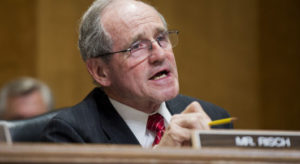by WorldTribune Staff, June 13, 2018
Senate approval of an arms agreement between the United States and North Korea has been discussed with President Donald Trump and his senior advisers, a senior member of the Senate Foreign Relations Committee said.

“We have been taken by the North Koreans at least a couple of times, and that’s not going to happen again,” Sen. Jim Risch, Idaho Republican, said in a meeting with reporters on June 11.
Senators were “deeply, deeply disappointed” when the Obama administration circumvented the Senate by determining the 2015 Iran nuclear deal was not a formal treaty that needed Senate ratification, Risch said.
“We all know how that ended,” Risch said. “I think it would have been different had we had a different role in that.”
Trump withdrew the U.S. from the Iran deal last month.
Following his summit with North Korean leader Kim Jong-Un In Singapore, Trump told reporters: “I would like to involve Congress” in denuclearization talks.
Risch’s comments on being “taken” by North Korea in the past alluded to the Clinton administration’s Agreed Framework with North Korea in 1994 and the George W. Bush administration’s six-nation nuclear talks.
The Clinton administration claimed the Agreed Framework was not a formal treaty.
“North Korea exploited the unratified accord to buy time to further develop nuclear weapons and missile programs,” security correspondent Bill Gertz noted in a June 13 report for the Washington Free Beacon.
“Then during the George W. Bush administration, six-nation nuclear talks also were used by Pyongyang as a delaying tactic to stave off tough U.S. policies and action by appearing to sincerely negotiate limits on its nuclear programs,” Gertz wrote. “North Korea continued to build its nuclear arsenal and is close to deploying a nuclear-tipped missile capable of ranging the entire United States.”
Gertz continued: “As with the Clinton administration and the Agreed Framework, the Obama administration also sought to avoid a certain political battle over the Iran nuclear deal in the Senate by not calling the Joint Comprehensive Plan of Action (JCPOA) a formal treaty. Instead, Obama and his advisers added several foreign states to the accord and then sought approval by the United Nations Security Council, rather than the Senate, to codify it.”
Under Article II of the U.S. Constitution, the president is granted the power to make treaties as long as two thirds of the Senate approves.
Subscribe to Geostrategy-Direct __________ Support Free Press Foundation
